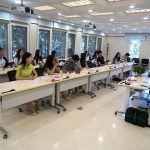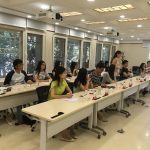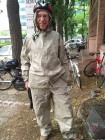On 10 March I was talking about the EU Climate Law on Indus News, the Special with Meshal Malik. It is the TV station from Pakistan. Interview by Skype, from my Beijing office.
Consumer & Environment Issues
consumer analysis and impact on environment
Biking and Chinese cultural conflict
On 29 August 2016 I was invited for a debate in Yenching Academy, in Beida (as we call it in Chinese). The students were all Chinese, the foreign students were not available.
The theme was Beijing air pollution. I gave a short introduction of my book “Toxic Capitalism”, the evolution of air pollution in Beijing and what we can do about it. Indeed, as I officially stated to the Beijing Government, traffic is a serious contributor to the air pollution and it is made worse by bad behavior of the drivers and the inaction of the traffic police.
See here the intro of the Academy from Yenching Academy
The Yenching Academy of Peking University builds bridges between China and the rest of the world through an interdisciplinary master’s program in China Studies for outstanding graduates from all over the globe. This initiative brings together young people who show promise to lead and innovate in their fields in an intensive learning environment where they can explore China and its role in the world – past, present, and future. The Academy aims to thereby shape a new generation of global citizens with a nuanced understanding of China and its role in the world.
Founded on the ideal of fostering global connections and dialogue, the Yenching Academy is a fully funded residential program offering a wide array of interdisciplinary courses on China within broadly defined fields of the Humanities and Social Sciences. Working closely with their academic mentors, Yenching Scholars are granted the flexibility to create their own study paths by choosing from six academic concentrations and a variety of extracurricular activities. Studying at the Academy represents a unique opportunity not only for intercultural and academic exchange, but also for personal and professional development.
Two Yenching scholars also gave a short intro for the debate, Ugne (Lithuania) and Ben (UK).
One of the main issues we have with using a bike instead of a car is the Chinese cultural and social “loss of face”. While in European countries even ministers go to work on their bike, Chinese object: it is a loss of face to go to a 5-star hotel or a business meeting on a bike. Furthermore girls who are looking for a husband have stringent requirements: he needs a good position, a house and a car. If not, bad luck.
Some in the audience said the bike trip could make too tired or make one sweat too much. As for myself I explained I have no problem to bike in the cold, the hot, rain or snow. It is a matter of being prepared (put the suit jacket and tie in a plastic bag!). Of course the poor biking lanes and dangerous car drivers are an issue indeed.
In the end, we all have to contribute for a better environment, it requires education, change of mindset and preparation.
I bike every day and just look at the enormous traffic jams and drivers looking for a parking spot.
As for rain protection, sadly to say, I had to buy the outfit in … USA, as Beijing rain caps are too badly made.
How did I go to Beida? It is the other side of Beijing. Well, simple: I jump on my bike to the subway station and then use the subway. The city has made enormous progress in building more subways and installing 68,000 public rental bicycles.
How much is the amount of construction waste in China?
In my book Toxic Capitalism I looked in detail at all kinds of waste. That turned out to be really complicated as there are different definitions of the different types of waste (e.g. municipal waste, domestic waste and more). One number I could not find was the estimate for construction waste in China. In my book I do mention the enormous waste due to constant renovations or tearing down rather “new” buildings. Well, I finally got a figure:
Source:
http://usa.chinadaily.com.cn/china/2015-05/05/content_20621886.htm
In 2013, China saw construction waste reach 1 billion tons, 26% of it from the process of building and 74% from demolition, according to a 2014 report on resources utilization released by the National Development and Reform Commission.
Only 5% of construction waste is recycled, which amounts to around 30 million tons annually, the report said.
The utilization rate of construction trash could reach 95%, as is the case in many developed countries.
The cultural gap in biking: China versus Europe
How many times was I told: “Gilbert, it’s a loss of face to go to an official meeting or a 5-star hotel on a bike. You are a boss, you cannot do this”.
So, why not? Many Chinese still have this attitude, brainwashed by their “loss-of-face” obsessions and the prestige to have a car. No thanks, we Europeans don’t think that way, leave the cars to the Americans with their automotive addiction. Now more and more European cities switch from cars to bikes and in many cities cars are the enemy – much like in my home town Ghent (Belgium). In several EU countries even ministers use a bike.
I also brought up this “loss of face” during my speech for the Exclusive Dialogue with Vice Mayor of Beijing Ms. Cheng Hong, see https://blog.strategy4china.com/?p=5343
Our Swedish friends showed the example in China Daily:
“Swedish Minister for Health Care, Public Health and Sport Gabriel Wikstrom (second from left), along with Swedish Ambassador to China Lars Freden (first left) and World Health Organization Representative Bernhard Schwartlander (right), ride bikes to a meeting at the WHO offices in Beijing to promote good health and environmental protection. More than 80% of Chinese adolescents do not get enough physical activity, a major risk factor in obesity and the development of chronic diseases.”
In polluted and congested Beijing, biking is the solution to get somewhere on time and to unclog the traffic. Also, I can have my beer(s) and bike home. With a car, zero drinking, plus no parking etc. On the positive side, the city government is increasing the outlets for rental bikes and media such as The Beijinger promote it nicely, see also their explanation of Chinese terms.
Yes, biking is a hazard as Chinese respect nothing and traffic regulations are a joke. Traffic police does not exist so Chinese do whatever suits them. Cars and arrogant pedestrians occupy biking lanes, all while looking at their mobiles and/or smoking. One traffic rule seems to be that under no circumstances should a driver keep his eyes off the mobile.
Anyway, I always bike. Cold, hot, rain, snow, sunshine. I am happy to have found in a U.S. supermarket a great rain outfit. USA, the country of cars has this stuff, China no. Get that.
Of course I look like coming back from Ebola country but I could not care less. The set is super light and compact and I can put it over my shoes, trousers etc. And unlike the Chinese rubbish clothes, it does stop the water.
See the pics. With and without on 27 April. And my friends on WeChat showed massive support…
As for my little funny red bike, well, I have it nearly four years. Rather of poor quality I have persevered in repairing it, in the spirit of “Toxic Capitalism”. Many parts have been changed but I always return to the same bike shop on Dongdaqiao Lu where the more-than-retired staff serve me well and cheaply. Once they worked on it one hour and was billed … 25 RMB.
Beijing finally decides a new policy for e-cars, as I had suggested
In my reports to the Beijing mayor (at that time, Guo Jinlong) and vice mayor I urged the Beijing government to allow e-cars to drive every day in Beijing, unlike other cars that are taken off the roads one day in the week.
See: Exclusive Dialogue with Vice Mayor of Beijing Ms. Cheng Hong,
https://blog.strategy4china.com/?p=5343
Well, finally they did it and as for now the e-cars face no more restrictions as from 11 April 2015 till 10 April 2016. Hopefully they will extend that as in my opinion this could be a major factor to convince people to buy an e-car. Other incentives are that it is practically easy to get a license plate, while for normal cars the lottery is pretty hard to get one. Obviously there is still a lot to do to increase the amount of charging stations.
Indeed, the government goals for e-cars are 500,000 new energy vehicles on the road by the end of 2015 and 5 million by 2020, but sales in 2014 were well below the target: 74,800 all-electric and plug-in hybrids.
It will be interesting to see the impact on sales later this year.
Read the full story here:
http://www.chinadaily.com.cn/business/motoring/2015-04/13/content_20420375.htm













